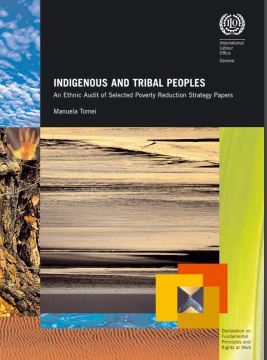Knowledge Hub

Indigenous and Tribal Peoples: An Ethnic Audit of Selected Poverty Reduction Strategy Papers
2005
Author(s): Manuela Tomei
Social and economic policies must recognize and accommodate indigenous and tribal peoples' needs, aspirations and rights. As district peoples, they have special rights (groups rights) that include the right to be different and to influence decisions affecting their livelihoods and future.

Peru has experienced substantial changes in recent years, especially in its economy. As from the 1990s, Peru has been able to recover from the critical situation of the 1980s, engaging in a series...

Indigenous Persons with Disabilities: Access to Training and Employment
2015
Author(s): Velarde R, Minerva C
Thus, this “guesstimate” may not be representative for some countries where the prevalence of disability amongst indigenous peoples tends to be higher than across the non-indigenous population due to severe poverty, exposure to violence and social deprivation.
Recommendations on Sustainable Development of Indigenous Tourism
2019
Author(s): World Tourism Organization (UNWTO)
The reports aim that these recommendations is to encourage tourism enterprises to develop their operations in a responsible and sustainable manner, while enabling those indigenous communities that wish to open up to tourism to take full grasp of opportunities that come along, following a thorough consultation process.

The Traditional Knowledge Advantage: Indigenous peoples’ knowledge in climate change adaptation and mitigation strategies
2016
Author(s): Chianese F, Cordone A, Darlong V, Firmian I
The inherent dynamism of indigenous peoples’ knowledge systems lies at the heart of their ability to adjust and modify their actions in response to environmental change. The diversity of resilience systems and capacities to adapt to climate change directly corresponds to the diversity of indigenous peoples and the different contexts they inhabit.Â
Briefing paper on Indigenous Peoples’ Rights and the 2030 Agenda
2017
Author(s): United Nations Department of Economic and Social Affairs
There is a strong commitment in the 2030 Agenda to empower and engage indigenous peoples in implementing and reviewing progress in achieving the goals. It is essential that the 2030 Agenda implementation is taken into account the principle of free, prior and informed consent and adequate consultations related to indigenous peoples’ lands and development priorities.
Intellectual Property and Arts Festivals
2016
Author(s): World Intellectual Property Organization
This brief identifies the main intellectual property challenges faced by organizers of arts festivals and outlines some practical elements of an effective intellectual property management strategy.
Developing a National Strategy on Intellectual Property, Traditional Knowledge and Traditional Cultural Expressions
2016
Author(s): World Intellectual Property Organization
This brief summarizes the legal, policy and operational issues that need to be considered in developing a national strategy for the intellectual property protection of traditional knowledge and traditional cultural expressions, also known as folklore.
Tapping Into the Knowledge of Indigenous Peoples
2015
Author(s): International Fund for Agricultural Development
The project helped promote partnerships with the main actors – grass-roots, national and global – who deal directly with many of the most critical indigenous peoples’ issues. It also helped capitalize on indigenous peoples’ knowledge and expertise in matters such as natural resources management, biodiversity and climate change.
Sustainable Development Goals: Indigenous Peoples in Focus
2016
Author(s): International Labour Organization (ILO)
The Sustainable Development Goals are grounded in a vision that aims to transform our world. They aspire to build a world free of poverty, hunger and disease, in which every woman and every girl enjoys full gender equality, where the environment is protected and where all people have access to quality education and decent work.



